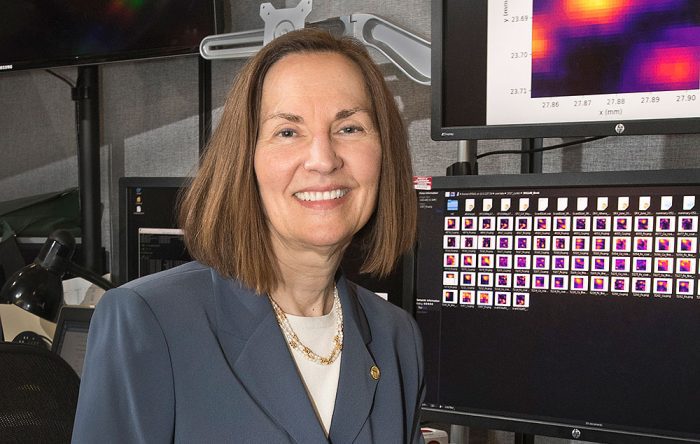By Daniel Dunaief

Esther Takeuchi has won numerous awards and received plenty of honors for her work.
In 2009, President Barack Obama presented her with a National Medal of Technology and Innovation, the highest honor possible for technological achievement in the country.
She has also been elected as a member of the American Academy of Arts and Sciences, received the 2013 E.V. Murphree Award in Industrial and Engineering Chemistry from the American Chemical Society and was selected as a Fellow of the American Institute for Medical and Biological Engineering and the American Association for the Advancement of Science, among others.
Takeuchi, who has over 150 patents to her name and is Distinguished Professor in Materials Science and Chemical Engineering at Stony Brook University and Chair of the Interdisciplinary Science Department at Brookhaven National Laboratory, spoke with Times Beacon Record News Media about a range of topics.
“In the long run, I think energy storage can significantly improve energy availability and affordability,” said Takeuchi. “We end up throwing a lot of [energy] away.”
Indeed, in a widely cited statistic based on a 2021 study, 65 percent of energy produced is thrown away. Energy from any source, whether it’s fossil fuels, sunlight, wind or nuclear, is inefficient, with losses from heat, limitations on technology, friction with machinery and incomplete combustion, among a host of factors.
“Let’s use it more effectively, where we can follow the load,” urged Takeuchi.
At the same time, Takeuchi recognizes the importance of ensuring the safety of energy storage, including for the proposed storage facilities in Setauket.
“The Fire Department and police need to be brought into the discussion,” she said. “A lot of these folks are extremely knowledgeable.”
Community education, involvement and awareness is necessary for any such project, ensuring that the appropriate people are informed and know how to respond to any crisis.
Energy needs
Future energy needs are considerably higher than they are today, thanks to the demands of artificial intelligence.
Large data centers that house the kinds of information necessary for AI are “incredibly power hungry,” Takeuchi said. If AI continues to expand at the current pace, it alone will use more energy than the world makes today.
“We need to have broader sources of energy” so it is available, she added. “Where is going to come from?”
Indeed, Takeuchi and her collaborators are working on energy storage that doesn’t use the kind of lithium-ion batteries that power much of consumer electronics. Lithium ion batteries are compact and are highly reactive, packing energy into a small volume. If something goes wrong, these batteries are flammable.
“We are working on a project at Stony Brook and Brookhaven National Laboratory where we’ve demonstrated electrolytes that don’t burn at all,” she said. “You can put a butane lighter on them and they won’t burn.”
To be sure, these batteries, which would be larger than the current systems, are a “long way” from commercialization, but it’s possible.
Still, Takeuchi is excited about rechargeable water-based batteries. She’s focused on making sure the materials are elements that are used broadly, instead of exotic materials mined in only one place on Earth. She’s also looking to create a cycle life that’s as high as possible.
Aqueous materials have a lower cycle life. She and her team are trying to understand why and overcome those challenges, which would enable these batteries to be recharged more times before degrading.
Funding environment
The current funding environment for science and technology has reached an uncertain time, Takeuchi said.
“One of the ways the United States has been so effective at competing economically on a global level is through science and technology,” she said. During many decades, the country has been an innovation leader as measured by the number of patents issued.
Driven by the Manhattan Project that built the atomic bomb, by frenzied competition with the Soviet Union after the launch of Sputnik in October of 1957 amid the Cold War, and by the drive to send people to the moon in the 1960’s, the country has attracted top talent from around the world while making important discoveries and creating new technology. Realizing that science and technology is a driver of future commercial and economic growth, other countries have been actively recruiting scientists concerned about the future funding landscape to their countries. This creates the potential for a brain drain.
If the United States gives up its leadership position when other nations are charging ahead, it could take a long time to recover the current standing, not to mention to mirror the successes and personal and professional opportunities from previous generations, said Takeuchi.
“Science is critical to lead us to the future we all want to live in,” she added.


















